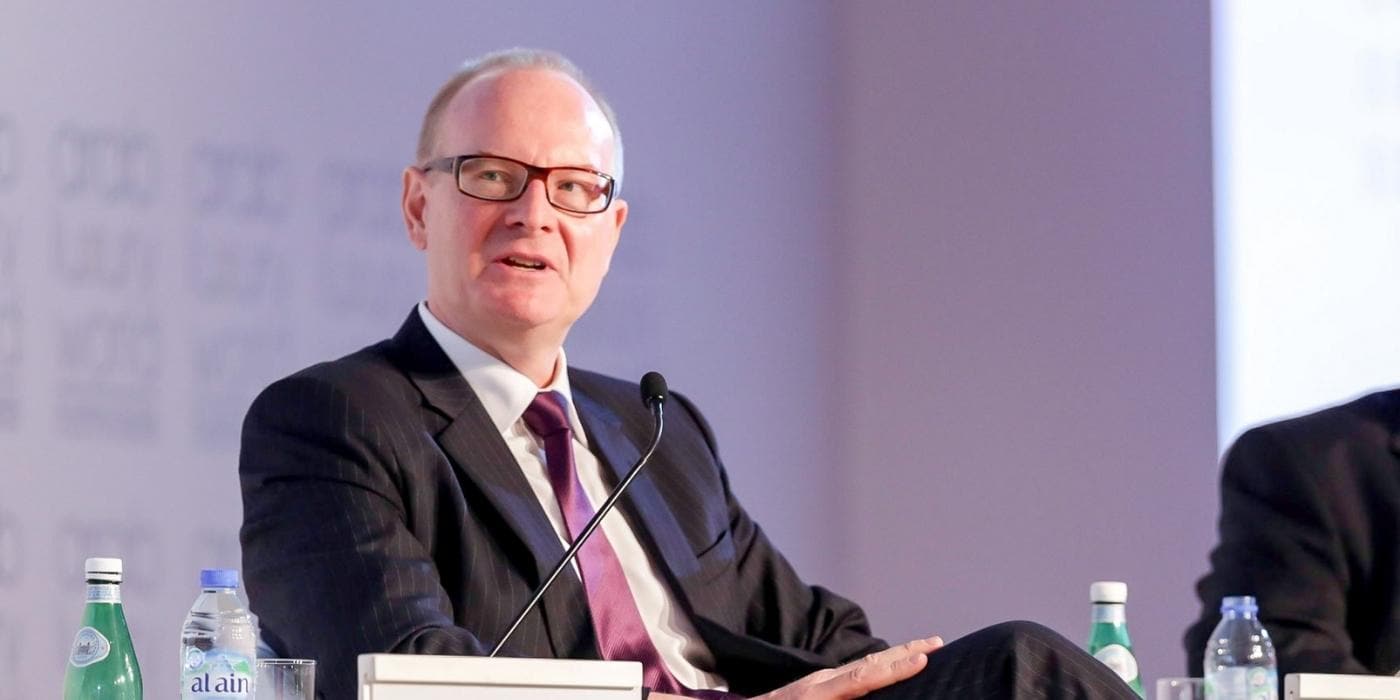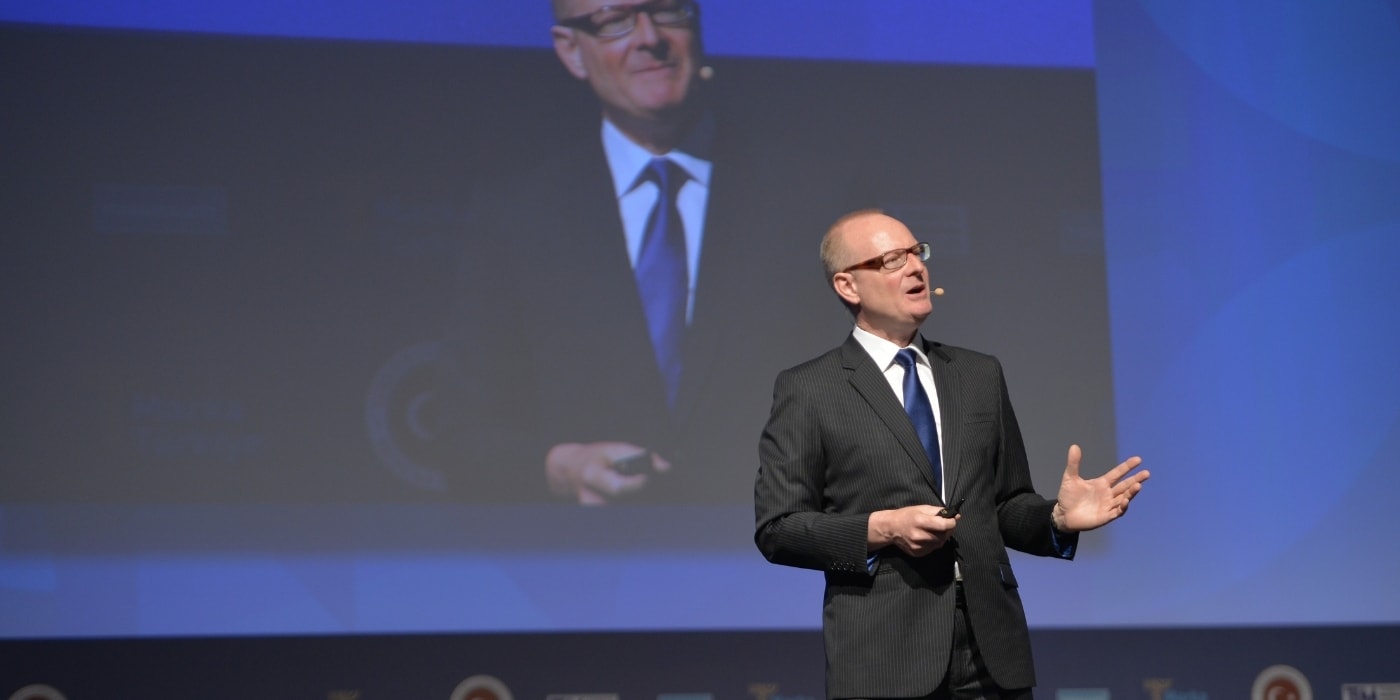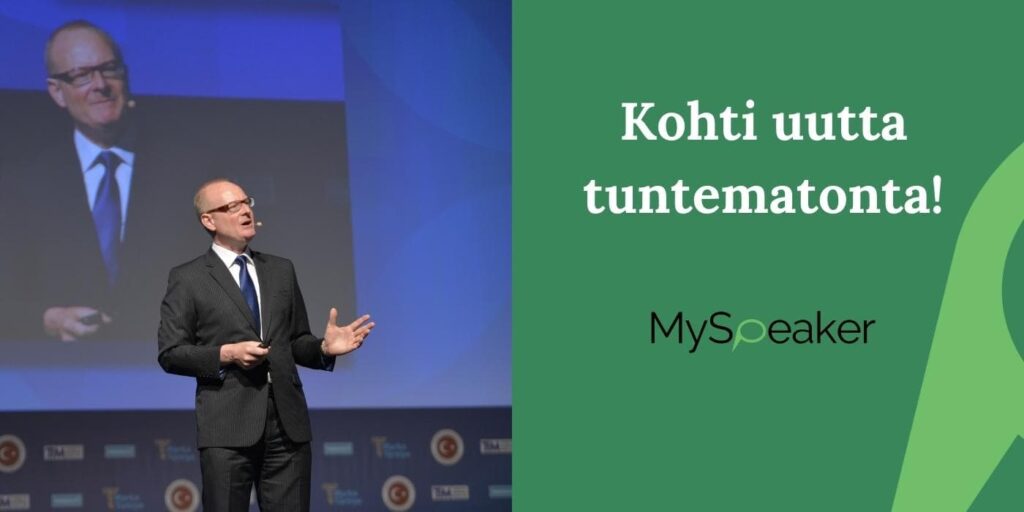Siirtyminen tähän pandemian edelleen varjostamaan uuteen vuoteen on vielä täynnä epävarmuutta – jatkuvia muutoksia, suuria kysymyksiä siitä, mitä tämä vuosi tuo tullessaan toimintaympäristöömme, työtapoihimme sekä erityisesti johtamiseen ja johtamiskulttuurin muutokseen vastaamaan tässä ja nyt vallitsevaan tulevaisuuden työhön. Tämä aika tuo mukanaan myös uusia mahdollisuuksia. Mahdollisuuksia uusiutua, kehittyä sekä terävöittää omaa ja tiimien tekemistä mm leadership- näkökulmasta. Olen nostanut tähän tammikuun kansainväliseen uutiskirjeeseeni raudanlujan bisness- ja strategia-asiantuntija, Martin Rollin. Martinin huikeaa kokemusta hyödyntävät niin globaalit suuryritykset kuin pienemmätkin toimijat, jotka haluavat terävöittää toimintaansa ja päivittää johtamiskulttuuriaan.
Martin Roll, Senior Advisor to Fortune 100 | Strategy, Leadership & Transformation Expert | INSEAD Distinguished Fellow | Harvard Board Advisor
 Martin is an experienced global business strategist, senior advisor and facilitator to Fortune 500 companies, Asian firms, family-owned businesses and family offices. He advises clients on strategy, transformation, leadership, family business & family office topics.
He is CEO of Martin Roll Company with more than 25 years of board & C-suite counselling experience. He is also an advisor to several global boards and prominent business families, and a mentor for more than 100+ next generation leaders in business families, start-ups and high-growth companies every year.
He has also served as a Senior Advisor to McKinsey & Company.
As a keynote speaker, Martin is highly accomplished in global conferences, an experienced conference moderator and executive workshop facilitator.
He is a Distinguished Fellow (family business) and Entrepreneur in Residence at INSEAD. Martin Roll is a Visiting Professor at China Europe International Business School (CEIBS) teaching courses in family business. He was also recently appointed Board of Advisor at The Harvard College Project for Asian and International Relations (HPAIR) in June 2020.
Leadership NOW!
The 21st century has been characterized by constant change and disruption. During this period the world has reached milestones never achieved before in history, which have greatly influenced the way people work and live. These achievements have significantly impacted how organisations work and how business are conducted globally.
An overarching consequence of these events has been the explosion and democratization of information. Combined with the accelerated pace of technology-driven globalisation, information has led to the creation of a flatter, seamless and fluid global economy.
We have also witnessed the rapid rise of emerging economies like China and India resulting in a shift in global economic power. All of these changes have significantly impacted the role of leadership in modern organizations. Modern leaders now have the challenging task of guiding their organisations through a complex and continually shifting global economic landscape. The impact of these strategic forces are felt not only at a country level, but filtered down to industries, markets, segments and individual products and brands. Effective leadership in these modern times requires a proactive approach towards managing change and its impact on long-term organizational growth.
Martin will share with you his insights into some of the key success factors for future-ready companies’ leaders as well as the qualities that leadership will need to possess in order to effectively tackle current challenges.
Martin is an experienced global business strategist, senior advisor and facilitator to Fortune 500 companies, Asian firms, family-owned businesses and family offices. He advises clients on strategy, transformation, leadership, family business & family office topics.
He is CEO of Martin Roll Company with more than 25 years of board & C-suite counselling experience. He is also an advisor to several global boards and prominent business families, and a mentor for more than 100+ next generation leaders in business families, start-ups and high-growth companies every year.
He has also served as a Senior Advisor to McKinsey & Company.
As a keynote speaker, Martin is highly accomplished in global conferences, an experienced conference moderator and executive workshop facilitator.
He is a Distinguished Fellow (family business) and Entrepreneur in Residence at INSEAD. Martin Roll is a Visiting Professor at China Europe International Business School (CEIBS) teaching courses in family business. He was also recently appointed Board of Advisor at The Harvard College Project for Asian and International Relations (HPAIR) in June 2020.
Leadership NOW!
The 21st century has been characterized by constant change and disruption. During this period the world has reached milestones never achieved before in history, which have greatly influenced the way people work and live. These achievements have significantly impacted how organisations work and how business are conducted globally.
An overarching consequence of these events has been the explosion and democratization of information. Combined with the accelerated pace of technology-driven globalisation, information has led to the creation of a flatter, seamless and fluid global economy.
We have also witnessed the rapid rise of emerging economies like China and India resulting in a shift in global economic power. All of these changes have significantly impacted the role of leadership in modern organizations. Modern leaders now have the challenging task of guiding their organisations through a complex and continually shifting global economic landscape. The impact of these strategic forces are felt not only at a country level, but filtered down to industries, markets, segments and individual products and brands. Effective leadership in these modern times requires a proactive approach towards managing change and its impact on long-term organizational growth.
Martin will share with you his insights into some of the key success factors for future-ready companies’ leaders as well as the qualities that leadership will need to possess in order to effectively tackle current challenges.
 Key success factors for 21st century leaders
The traditional viewpoint of corporate leaders being viewed as figureheads, chiefs and commanders is rapidly losing its importance. The traits commonly associated with these positions, charisma and vision, are still important in leadership positions, but they are in itself not enough. To be successful in today’s dynamic business landscape, leaders need to be able to shift between their multiple roles with ease. At one point they might need to act as commander-in-chief of their organisations, while at another point they might need to act as mentors to a high performance team or an individual. It is all about leadership versatility and being able to lead effectively across generations, cultures, mindsets and differing sets of motivations.
Some critical success factors for 21st century business leaders include:
Purpose: Having a purpose is important but it is critical to have an inspirational one. Leaders need to have a personal purpose (“what I want this organization to achieve”) but it should be aligned with that of the organizations’ (“what this organization stands for”). Both companies and its leadership teams should have a clear purpose that goes beyond annual revenue and profitability targets. An unwavering focus, a clear vision and true belief in the purpose means that leaders need to walk-the-walk, not just talk-the-talk. Leaders who do not practice what they preach are abandoned very quickly. The same happens to leaders who do not lead with clarity and focus. The 21st century requires all of these to be essential traits of leadership.
Resilience: As mentioned before as a key implication, resilience is also going to be a much sought after trait amongst leaders in today’s times. Resilient leaders see failures as temporary setbacks and opportunities to learn from. They also have a strong character and positive attitude during periods of turbulence. When faced with uncertainty, a resilient leader finds ways to constantly move forward and stay ahead of the curve. To demonstrate resilience, leaders need to communicate frequently and with intent, be bold while taking long-term strategic bets, and champion a constantly improving mindset in the organization.
Networks: Many leaders underestimate the power of networks both inside and outside their organizations. Some benefits of tapping into and leveraging networks include:
Key success factors for 21st century leaders
The traditional viewpoint of corporate leaders being viewed as figureheads, chiefs and commanders is rapidly losing its importance. The traits commonly associated with these positions, charisma and vision, are still important in leadership positions, but they are in itself not enough. To be successful in today’s dynamic business landscape, leaders need to be able to shift between their multiple roles with ease. At one point they might need to act as commander-in-chief of their organisations, while at another point they might need to act as mentors to a high performance team or an individual. It is all about leadership versatility and being able to lead effectively across generations, cultures, mindsets and differing sets of motivations.
Some critical success factors for 21st century business leaders include:
Purpose: Having a purpose is important but it is critical to have an inspirational one. Leaders need to have a personal purpose (“what I want this organization to achieve”) but it should be aligned with that of the organizations’ (“what this organization stands for”). Both companies and its leadership teams should have a clear purpose that goes beyond annual revenue and profitability targets. An unwavering focus, a clear vision and true belief in the purpose means that leaders need to walk-the-walk, not just talk-the-talk. Leaders who do not practice what they preach are abandoned very quickly. The same happens to leaders who do not lead with clarity and focus. The 21st century requires all of these to be essential traits of leadership.
Resilience: As mentioned before as a key implication, resilience is also going to be a much sought after trait amongst leaders in today’s times. Resilient leaders see failures as temporary setbacks and opportunities to learn from. They also have a strong character and positive attitude during periods of turbulence. When faced with uncertainty, a resilient leader finds ways to constantly move forward and stay ahead of the curve. To demonstrate resilience, leaders need to communicate frequently and with intent, be bold while taking long-term strategic bets, and champion a constantly improving mindset in the organization.
Networks: Many leaders underestimate the power of networks both inside and outside their organizations. Some benefits of tapping into and leveraging networks include:
- Getting to know key stakeholders in the organization better
- Identifying challenges that are inhibiting teamwork and innovation
- Effective cascade of critical communication to the most influential stakeholders
- Finding and recruiting top talent in the marketplace
- Identifying potential new suppliers, new technologies, consultants or other leaders in the same industry that could help accelerate business performance
- Creating, shaping and implementing effective career paths
 Conclusion: Leadership in the 21st century will be challenging but rewarding
The late professor Peter Drucker once said, “Wherever you see a successful business, someone once made a courageous decision”. Leadership in this century will be a combination of multiple courageous decisions. Although it is more challenging, the impact of positive leadership will also be very high during these times. Some of the headwinds that global business is facing currently are the strongest ever in the history of the world economy. To effectively navigate an organization through such headwinds, it needs leaders with courage, conviction, strong mental resolve, unwavering focus and a strong sense of purpose.
But we also need to keep in mind the fact that a leader cannot achieve anything alone. This is more relevant now than it was before. To achieve critical organizational objectives, a leader needs to have an open mind, should be open to collaboration, have the ability to align differing viewpoints and should have the charisma to lead teams with differing motivations and needs.
Although it seems that leadership in this century is highly challenging, it can be highly rewarding when done right. Whether it is an individual or a leadership team, the characteristics of effective leadership are applicable to both. The individual human traits of leadership are the pillars of this effective leadership model. Organizations need to constantly identify leaders with such traits or they need to train their existing leadership teams to acquire these traits.
Are you imbibing your organizational leadership teams with these critical success factors? What challenges are you facing and how do you plan to overcome them?
Lue lisää Martinista!
Conclusion: Leadership in the 21st century will be challenging but rewarding
The late professor Peter Drucker once said, “Wherever you see a successful business, someone once made a courageous decision”. Leadership in this century will be a combination of multiple courageous decisions. Although it is more challenging, the impact of positive leadership will also be very high during these times. Some of the headwinds that global business is facing currently are the strongest ever in the history of the world economy. To effectively navigate an organization through such headwinds, it needs leaders with courage, conviction, strong mental resolve, unwavering focus and a strong sense of purpose.
But we also need to keep in mind the fact that a leader cannot achieve anything alone. This is more relevant now than it was before. To achieve critical organizational objectives, a leader needs to have an open mind, should be open to collaboration, have the ability to align differing viewpoints and should have the charisma to lead teams with differing motivations and needs.
Although it seems that leadership in this century is highly challenging, it can be highly rewarding when done right. Whether it is an individual or a leadership team, the characteristics of effective leadership are applicable to both. The individual human traits of leadership are the pillars of this effective leadership model. Organizations need to constantly identify leaders with such traits or they need to train their existing leadership teams to acquire these traits.
Are you imbibing your organizational leadership teams with these critical success factors? What challenges are you facing and how do you plan to overcome them?
Lue lisää Martinista!
 Kohti ääretöntä ja sen yli!
Susanna Hagelstam
Senior Account Manager, International Speaker Relations
susanna.hagelstam@myspeaker.fi
Puh. +358 46 923 1322
Kohti ääretöntä ja sen yli!
Susanna Hagelstam
Senior Account Manager, International Speaker Relations
susanna.hagelstam@myspeaker.fi
Puh. +358 46 923 1322
